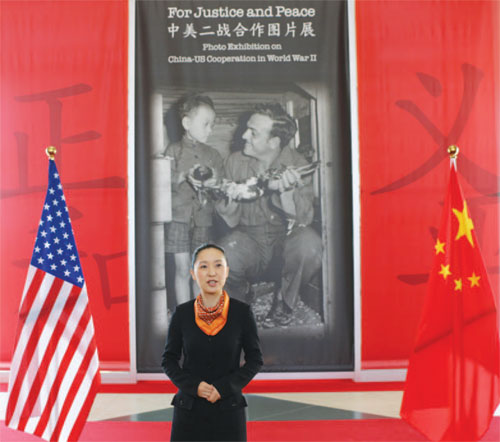 |
|
Wu Xi, deputy chief of mission at the Chinese Embassy in Washington, speaks to reporters on Aug 28 about a photo show on China-US cooperation during Worlld War II. [Photo/ China Daily |
US President Barack Obama, British Prime Minister David Cameron, French President Francois Hollande, German Chancellor Angela Merkel and Japanese Prime Minister Shinzo Abe should have been among the world leaders attending the parade in Beijing on Sept 3 to commemorate the 70th anniversary of the end of World War II, because, as influential leaders, they are expected to provide global leadership and safeguard peace and stability.
But these leaders will not attend the parade and other commemorative events. In the process, they seem to have suggested that they see the world in terms of "us" and "them", "West" and "East".
The leaders had also collectively boycotted the V-Day parade that Russia held on Red Square about four months ago, although Merkel visited Moscow the day after. However, despite skipping the Sept 3 parade in Beijing, Western leaders will send officials to represent them. Abe has refused to do that, and even did not send the Japanese ambassador to present at the parade.
But Chinese officials have said representatives of 49 countries and 30 foreign leaders will attend the Sept 3 event, with 17 countries taking part in the parade. So the commemorative events are not been observed by China alone.
European leaders (sometimes joined by US presidents) have laid collectively wreaths every year at sites that are historically important for the two world wars. Through their joint efforts, European leaders have put the genie of war back in the bottle. If that collective feeling had spread to the parades in Moscow and Beijing, the Western leaders' promise of making the world a peaceful place would have sounded more convincing.
Unfortunately, that has not happened. When Western leaders skipped the Moscow parade, Russian youths said they lacked wisdom, vision and courage. Chinese youths are likely to use the same words to describe the Western leaders' attitude toward the Beijing parade that is being held to commemorate the world's victory against fascism.
Chinese officials, on their part, have been open-minded in their response to Western leaders' attitude, for they have "warmly welcomed" every guest with honor and said every country has right to decide whether or not it wants to attend the event.
This year is important not only because it marks the 70th anniversary of the end of Word War II, the victory against Nazi Germany and fascist Japan, and the establishment of the United Nations, but also because it marks the 40th anniversary of Sino-EU diplomatic relations.
Amid growing economic uncertainties, world leaders are also expected to reach a deal to fight global warming. Besides, the world is also facing increasing challenges in terms of regional security, terrorist attacks and migration problems.
With such a long list of daunting tasks, the world leaders should capitalize on every occasion to sit together in a bid to address the problems in the best way possible, instead of deepening the mistrust and widening the gap.
The public image of Western leaders' is one of making efforts to build a peaceful world. These leaders also want China and other emerging economies to share more responsibilities for global peace and development.
But for that to happen, the world needs the right leadership, consensus, frankness and solidarity. And this makes it imperative for leaders with vision to not miss any occasion to build such synergy.
The Western leaders who have decided to stay away from the Beijing parade will meet their counterparts from the rest of the world at the UN headquarters in New York, the G20 summit in Turkey and the UN climate change conference in Paris. Hopefully, they will use the occasions to make real efforts to make the planet a better place.
The author is China Daily chief correspondent in Brussels. fujing@chinadaily.com.cn

I’ve lived in China for quite a considerable time including my graduate school years, travelled and worked in a few cities and still choose my destination taking into consideration the density of smog or PM2.5 particulate matter in the region.